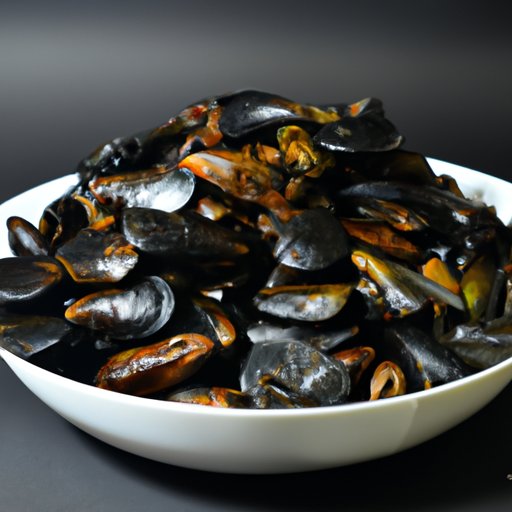
Introduction
Pregnancy is a time when women become acutely aware of what they are consuming. Eating healthy is important, but it is also essential to know what foods can pose a risk to the developing baby. One food that women may be unsure about are mussels. So, can you eat mussels while pregnant? Let’s explore the facts.
Eating for Two: The Facts About Mussels and Pregnancy
Mussels are a nutritious source of protein, vitamins, and minerals, making them a great food choice for pregnant women. They are low in fat and high in omega-3 fatty acids, which help with brain and eye development in the fetus. Mussels also contain iron, which is crucial for red blood cell production.
However, one concern with eating mussels during pregnancy is the risk of mercury exposure. Mercury is a toxic metal found in some seafood, including shellfish like mussels. High levels of mercury can cause developmental problems in the brain and nervous system of the fetus. However, research shows that mussels contain low levels of mercury, making them a safe seafood choice for pregnant women.
The Food and Drug Administration (FDA) and Environmental Protection Agency (EPA) both recommend that pregnant women can safely consume up to 8-12 ounces of low-mercury seafood per week. A 3-ounce serving of mussels contains only 0.02 parts per million (ppm) of mercury, which is well below the FDA’s limit of 0.3 ppm for safe consumption.
Keeping Your Baby-To-Be Safe: Understanding the Risks of Eating Mussels During Pregnancy
While mussels are a safe seafood choice during pregnancy, it is important to be aware of the potential risks associated with consuming them. The most significant risk is bacterial contamination, which can cause foodborne illness, such as listeria or vibrio infections. Pregnant women are more susceptible to these infections, which can cause miscarriage, stillbirth, premature delivery, and other serious health problems for the fetus.
To minimize this risk, it is essential to ensure that mussels are cooked properly. The FDA recommends cooking mussels until they reach an internal temperature of 145°F (63°C). Additionally, pregnant women should only consume mussels from reputable and safe sources, such as those that have been harvested and stored correctly.
Healthy Eating Habits for Expecting Mothers: Including or Avoiding Mussels?
The decision to include or avoid mussels during pregnancy will ultimately depend on a range of factors, including personal taste and individual circumstances. For women who are seafood lovers, with no dietary restrictions or allergies, including mussels in their pregnancy diet can provide a healthy source of nutrition. However, women who are worried about the potential risks should avoid consuming mussels or other shellfish altogether.
If a woman is unsure about whether to include mussels in her diet during pregnancy, she should speak with her healthcare provider to discuss her options and any potential risks. They can provide guidance on how to make a safe and healthy decision based on individual needs and circumstances.
Pregnancy Cravings and Nutrition: Can Mussels Be a Healthy Addition to Your Diet?
During pregnancy, it is common for many women to experience food cravings. Some women may crave seafood, including mussels. In most cases, it is safe to indulge these cravings, as long as the food is cooked properly and consumed in moderation. However, women should remain mindful of the potential risks associated with consuming mussels during pregnancy, especially when eating from unfamiliar sources.
Making Smart Choices: How to Incorporate Mussels into a Safe and Healthy Pregnancy Diet
If a pregnant woman chooses to include mussels in her diet, there are several ways to do so safely. First, it is essential to choose mussels that are fresh and have been harvested from safe sources. When cooking mussels, ensure they are heated to the correct internal temperature, which takes around 5-7 minutes in boiling water or in a steamer. Mussels can be enjoyed alone or added to stir-fries, pasta, and soups for extra flavor and nutrition.
Conclusion
Mussels can be a valuable addition to a healthy pregnancy diet, offering essential omega-3 fatty acids and other vital nutrients. While concerns exist with the consumption of any seafood during pregnancy, mussels are a safe and healthy option when cooked and handled correctly. However, women should always consult their healthcare provider regarding any new additions to their diet during pregnancy.





